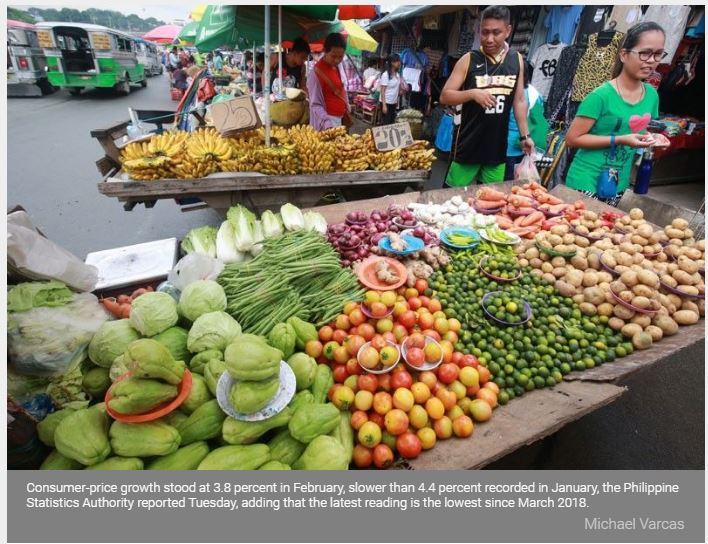Philippines: Monthly inflation rate finally falls within target in
MANILA, Philippines (Update 2, 10:38 a.m.) — Philippine inflation decelerated for another month in February, bringing the two-month tally near the government’s target range for the year.
Consumer-price growth stood at 3.8 percent in February, slower than 4.4 percent recorded in January, the Philippine Statistics Authority reported Tuesday, adding that the latest reading is the lowest since March 2018.
Year-to-date, inflation averaged 4.1 percent, inching closer to the state’s 2-4 percent target band. This is also the first time in a year since the monthly rate fell within the target.
“Slowdown in inflation remained to be primarily attributed to the slower annual increase in the index of the heavily-weighted food and non-alcoholic beverages at 4.7 percent,” the PSA said.
“Annual gains were also slower in the indices of other commodity groups, except for communication and education,” it added.
Higher excise taxes on certain commodities, food supply bottlenecks and rising fuel prices pushed up inflation last year, and it spiked to a near-decade high in September and October before it started to cool down.
In a bid to fight capital outflow and keep inflation in check, the Bangko Sentral ng Pilipinas lifted its policy rate by a cumulative 175 basis points last year before slamming on the brakes in December. At its first meeting for 2019, the policy-making Monetary Board left the key rate untouched at 4.75 percent.
The central bank also adjusted their inflation forecasts, with soaring prices now seen averaging 3.07 percent in 2019 from an earlier projection of 3.18 percent, and 2.98 percent next year from 3.04 percent previously.
Excluding items with volatile price movements, core inflation — often used as an indicator of long-term inflation trend — eased to 3.9 percent last month from 4.4 percent in January.
“The moderation in core inflation confirms a broad-based easing in price pressures,” ANZ Research said. “It should also go some way in re-anchoring of inflation expectations.”
Commenting on the February inflation figure, BSP Deputy Governor Diwa Guinigundo said the latest data is “consistent” with monetary authorities’ forecast.
“We continue to consider our current monetary settings as appropriate given the emerging risks both here and abroad,” Guinigundo said in a statement.
“However, the Monetary Board will be meeting this month precisely to review the stance of monetary policy given the expected new data that would be available from now until the next meeting against the backdrop of a softening global economy,” he added.
‘Premature’
In the same statement, Guinigundo said it is still “premature” to talk about cuts to bank reserves and interest rates, with the year-to-date inflation figure still above-target.
“More important, our latest forecasts for the next two years are anchored on the current policy rate of 4.75 percent. But these policy issues will remain on the table,” the BSP official said.
“Timing is the crucial issue.”
The central bank’s next policy review is on March 21.
According to ANZ Research, “the pace of decline [in inflation] will likely slow going forward.”
“Oil prices have recovered recently and evidence suggests that rice prices may also be bottoming out,” it said. “Even so, headline inflation should remain within the BSP’s target in the coming months. Against this backdrop, we expect the BSP to keep rates unchanged at its meeting on 21 March.” — with a report from BusinessWorld
Source: https://www.philstar.com/business/2019/03/05/1898866/monthly-inflation-rate-finally-falls-within-target-february#fqj3DgOLADwKptsS.99


 English
English




